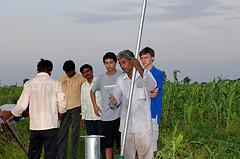
Rujul Zaparde started an NGO called Drinking Water for India in 2007 when he was still just an 8th grade student. In a previous article published on 07 December 2010, Zaparde said, “On the drive to Paras [a rural village in India] in 2007, I saw at least 25 other villages with the same problem. Villagers had to walk long distances to find clean drinking water. I figured, if we can help one village, we can help more”.
How did an 8th grade student, together with his peer Kevin Petrovic, start an NGO that brings clean water to rural communities in India? What were some of their challenges and triumphs? If Zaparde and Petrovic could start an NGO, what would the global impact of youth involvement mean for international development work?
When Zaparde and Petrovic filed paperwork to start an NGO in 2007, neither boy was of legal age to sign binding documents. But the two didn’t allow an administrative detail like age to hinder their progress. Zaparde’s father signed the final legal documents to get the NGO started. But Zaparde soon realized that signatures and paperwork were the easy part of launching a water project abroad; the challenges of running an NGO had yet to be confronted by the two boys.
“Fundraising and spreading the word about our NGO was the hardest part of the process”, said Zaparde. Since the two boys are still in high school, they had to balance their school work with their development work. To this day, Zaparde doesn’t receive any special treatment from his school teachers because of his NGO. “I still can’t miss a certain number of days from school. So, if I take time off, I have to make up the work and papers have to be signed”, he said.
Drinking Water for India is funded by grassroots campaigns typically hosted and participated in by other high school students. “Contacting principals and asking for the chance to present our work is hard. A lot of principals don’t want students to take time away for our presentations”, Zaparde elaborated. One hopes that these school principals aren’t undervaluing real life knowledge and experience getting an education.
Despite various pitfalls and time constraints, Drinking Water for India has certainly seen unexpected successes. “There was one school in New Jersey that I tried to contact at least 13 or 14 times. Eventually, I was able to present to the school and several other schools immediately contacted us expressing interest in our work. One was an elementary school that organized a walk-a-thon for our cause”.
Why did Zaparde choose to dig water wells in rural villages of India? Was that the most sustainable solution for the communities? Water wells were the first choice for Drinking Water for India because a well is immediate source of clean water for villagers.
Now, Drinking Water for India is expanding its water work to include rain water harvesting projects to keep water wells replenished and give local farmers access to a consistent water source for their crops. “The whole economy is based on farmland, so crops will turn out better for farmers with a reliable water source. It will make a larger impact on the village”.
Water wells provided by Drinking Water for India are strategically located close to schools to jointly address both education and agriculture, key areas that impact a village most. Better crops generate more income for local farmers; clean water in schools means that children can attend every day of the year, raising literacy levels in these remote and sometimes forgotten areas of India.
So, can you be as socially responsible as an 8th grader? Do you have an idea that could change your local community or the lives of people you’ve never met? “Sometimes, the acronym ‘NGO’, intimidates people. But anyone who sees a problem and a solid solution to it can start one. If everyone contributes in small ways, we can make a huge difference in the world”, concluded Zaparde.
And there you have it, the secret to a socially responsible way of saving the world—village by village, from an 8th grader!
If you enjoyed this article, please read Part I of this series:
Student NGO Builds Water Wells in India
Other articles that may interest you on WaterWideWeb:
Giving the Gift of Clean Water This Holiday Season
Anheuser Busch :Brewing a Beerable Future
Part I in a Series: Nautical Archaeology Threatened by Trawling
Part II in a Series: UNESCO Works to Preserve Nautical Archaeology
The photograph above was provided by Drinking Water for India. Rujul Zaparde and Kevin Petrovic are co founders of Drinking Water for India.


Hello! Thanks for reading our posts. WaterWideWeb.org is committed to bringing readers intriguing articles on a variety of water-related issues. In our research, we stumbled across this organization and had to post on it. I’m so glad that you enjoyed!